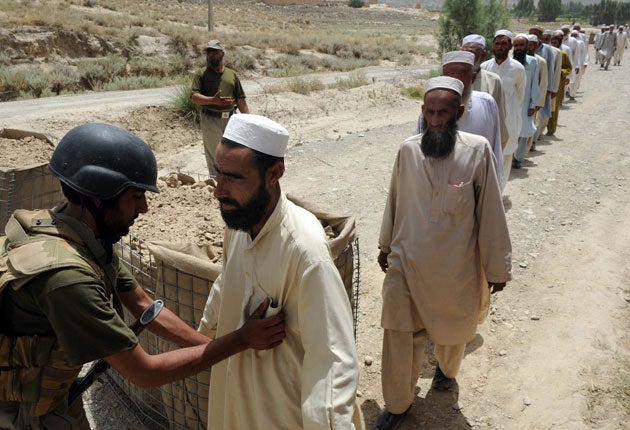Peace talks with Taliban edge closer
Coalition leaders talk up prospects of negotiated Afganistan settlement

Prospects of face-to-face peace talks between the Taliban and Western forces in Afghanistan moved closer last night after President Obama's defence chief suggested that "military realities" could force an early political settlement.
Robert Gates, the outgoing US defence secretary, said military pressure on the Taliban could lead to "real opportunities" for peace talks, forcing the insurgents to the negotiating table within a year.
His contribution to the "diplomatic surge", pushing for a negotiated end to a war now in its 10th year, is the latest sign that coalition forces are open to talks with their enemy to prepare the way for withdrawal from Afghanistan by the end of 2014.
Talks are believed to have been progressing already, at the very least between the Taliban and Afghan officials. But senior coalition figures, including President Obama and Mark Sedwill, Nato's top civilian representative in Afghanistan, have in recent weeks increased the likelihood, particularly amid the political fallout from the killing of Osama bin Laden.
Mr Gates said US-led forces had pushed the Taliban out of its bastions in the south and there was mounting evidence that insurgents were suffering battlefield setbacks. Officials yesterday claimed that a US drone strike had killed one of Pakistan's most senior militants, in what was described as a major blow to al-Qa'ida and the Taliban.
Ilyas Kashmiri, who has been mentioned as a possible successor to Bin Laden, is believed to have been one of nine people killed in an overnight attack in South Waziristan.
But he stressed the Islamist militia would have no say in the future of the country unless they laid down their arms, cut ties with al-Qa'ida and accepted Afghanistan's new democratic constitution.
"There is a generally accepted view that primarily all conflicts of this kind eventually come to a close with some kind of a political settlement," Mr Gates told a security conference in Singapore. "But the reality is that the prospects for a political settlement do not become real until the Taliban and the other adversaries – the Afghan adversaries – begin to conclude they cannot win militarily."
Mr Gates added: "If we can sustain those successes, if we can further expand the security bubble... perhaps this winter, the possibility of some kind of political talks, or reconciliation, might be substantive enough to offer some hope of progress."
His latest words reinforced a similar message in a radio interview during which he described the Taliban as "part of the political fabric of Afghanistan". They came amid a growing acceptance that the two sides were moving closer to dialogue.
The Afghan government is believed to have been holding on-off negotiations with the Taliban for several years. But, as the deadline for handing responsibility for security to the Kabul government approaches, support from the West has intensified.
It was claimed last week that Britain and the US were pressing for the lifting of United Nations sanctions against 18 former top Taliban figures to enable talks to progress. US diplomats are also rumoured to have held at least three face-to-face talks with a top Taliban spokesman in Germany and Qatar in the past two months. Germany is preparing to host an international Afghanistan peace conference in December which may include a Taliban delegation.
President Obama said last month a political settlement would "ultimately [mean] talking to the Taliban", although he laid out the "bare-bones requirements" his administration would demand from the insurgents before any agreement was possible.
"We've been very clear about the requirements for any kind of serious reconciliation. The Taliban would have to cut all ties to al-Qa'ida. Renounce violence. And they would have to respect the Afghan constitution," he said.
In its latest Afghan conflict progress report, the UK Government said: "We should take this opportunity to send a clear message to the Taliban: now is the time to separate themselves from al-Qa'ida and participate in a peaceful political process."
Mr Sedwill, a British diplomat, said: "The time is now right to take the risk and pursue the political agenda with the same energy we have brought to the military and civilian surges."
The announcement of the latest British soldier to be killed in Afghanistan underlined the fact that the conflict continues. The soldier, from The Highlanders, 4th Battalion The Royal Regiment of Scotland, died on Friday after coming under fire from rifles and rocket-propelled grenades in the Lashkar Gah district. The victim's next of kin had been informed. The latest death brings the number of British military deaths in operations in Afghanistan since 2001 to 369.
Four members of the International Security Assistance Force were also killed by a bomb in eastern Afghanistan yesterday.
Join our commenting forum
Join thought-provoking conversations, follow other Independent readers and see their replies
Comments
Bookmark popover
Removed from bookmarks